Ecotourism is a type of travel that is gaining in popularity with travelers being more conscious of their carbon footprint. In this analysis, we look into some of the latest ecotourism statistics, and see how sustainable tourism is changing the travel industry.
Key ecotourism statistics
- The global ecotourism market size is expected to have increased by 13.5% to $249.16 billion in 2024, from $219.53 billion in 2023, and is predicted to reach $428.97 billion in 2028.
- Choosing sustainable accommodation costs an average of $151 less per night, and was an average of 39% cheaper than non-sustainable options.
- A sizeable 80% of travelers said that traveling more sustainably is important to them.
- Over half (53%) of global travelers say they are looking for accommodation that combines comfort with innovative sustainability features in 2024.
- Online searches for ‘sustainable travel’ increased by 26% between March 2019 and March 2024.
- Three in five (62%) travelers said that they planned to stay in some form of sustainable accommodation at least once in the next year.
- The majority of global travelers (66%) said they wanted to have authentic travel experiences that represent the local culture and communities.
- One-third (33%) of travelers said they would go on trips closer to home in order to reduce their carbon emissions.
What is ecotourism?
Ecotourism is a type of tourism that involves traveling responsibly to natural areas, conservation of the environment, and maintaining the well-being of local people.
Also known as sustainable tourism, this type of travel is on the rise as travelers look to explore trips that reduce their impact on the environment and support local communities. The phrases ‘ecotourism’ and ‘sustainable tourism’ were first used in books in the 1980s and have grown in popularity since then.
Popular ecotourism activities
Some common ecotourism activities that travelers may take part in on this type of trip include:
- Small group eco tours
- Hiking or trekking through nature
- An eco-friendly cruise
- Tree planting trips
Ecotourism market size
By the end of 2024, the ecotourism market size globally is predicted to grow to $249.16 billion, an increase of 13.5% from $219.53 billion in 2023. By 2028, the global ecotourism market size is expected to increase to $428.97 billion, with a compound annual growth rate (CAGR) of 14.5%.[1]
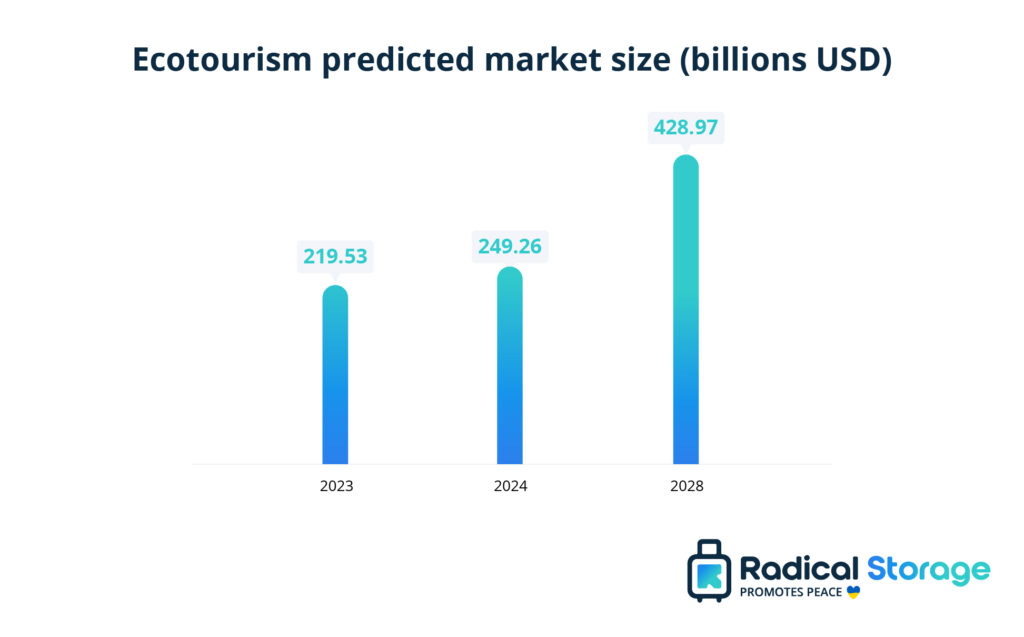
How many people travel sustainably?
A third (33%) of travelers surveyed said that they had stayed in sustainable accommodation in the past year. Based on the over 65.3 million American citizens who traveled abroad in 2023 (Oct 22 – Oct 23), this means approximately 21.55 million people chose sustainable accommodation in 2023.
Public interest in sustainable tourism
We collected data on online Google searches for sustainable tourism-related phrases to determine the change in public interest in this topic over time.
Online searches for the phrase ‘sustainable travel’ have been on the rise in the U.S., with 841 monthly searches in March 2019 growing to 1,061 in March 2024, an increase of 26%. However, searches for ‘sustainable travel’ peaked in April 2023 at 1,856.
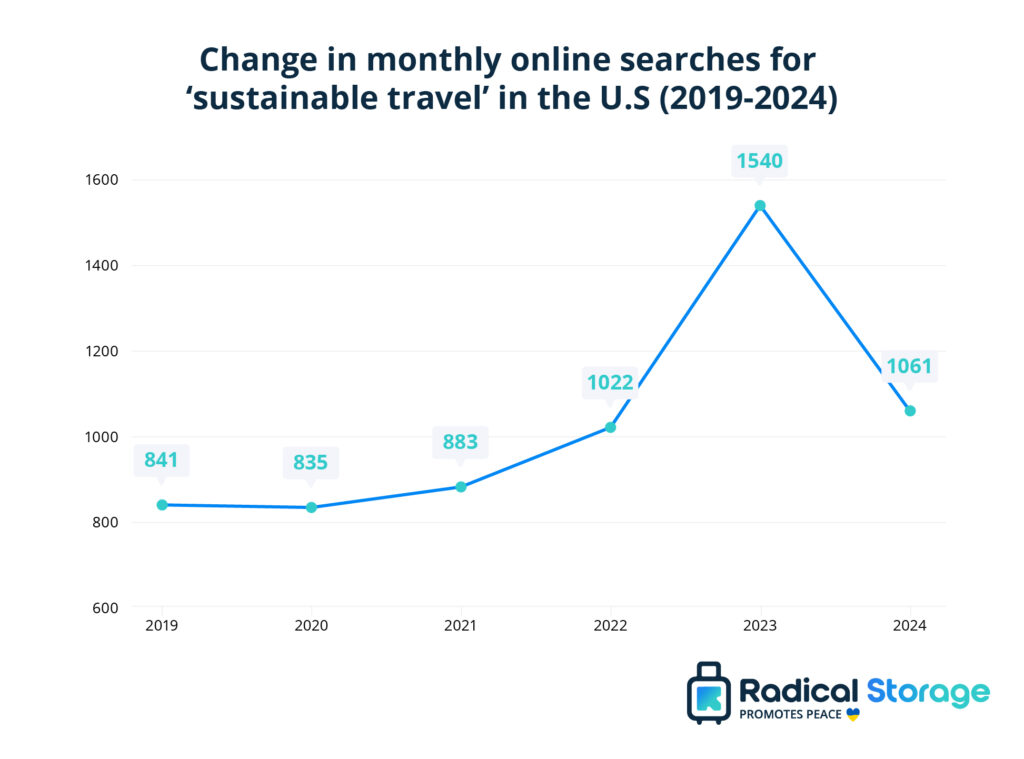
A quarter of travelers have said that they have seen sustainable accommodation options while looking at online travel sites in the past, and 29% said they would actively look for information on sustainability before making a booking.
Of those asked, 80% said that traveling more sustainably is important to them; this figure has increased from 71% in 2022. A further 43% would consider themselves knowledgeable about sustainability, with the news and social media providing the most information on the topic.[6]
Why do people choose sustainable travel?
There are a number of reasons why someone would specifically look for sustainable accommodation or eco-friendly travel providers. Almost half (46%) of travelers surveyed said that they had used sustainable accommodation during the past 12 months. Some of the reasons travelers highlighted for staying in these places include:
- To help reduce their impact on the environment (31%)
- They believe that sustainable properties are better for the local community (24%)
- They wanted to have a travel experience that was more relevant to the local area (21%)
Of those who said they hadn’t stayed in sustainable accommodation during the past year, 31% said they didn’t know they were an option, and 29% said they didn’t know how to find them. These figures suggest that more can be done to make these locations more accessible to those who might be interested in pursuing ecotourism.[2]
Attitudes towards sustainable travel
Some global travelers have a perception of ecotourism and sustainable destinations which makes them less inclined to book this kind of trip. Some of the reasons travelers said they wouldn’t choose sustainable accommodations were that other types of travel appealed to them more (32%) and that sustainable travel doesn’t provide the luxury they want (27%).
Barriers to sustainable tourism
Travelers cited a number of barriers that they felt made it more difficult to choose eco-friendly travel options. Over half (51%) of people think that there are not enough sustainable travel options available, while 44% don’t know where to find sustainable options.
Three-quarters (75%) of travelers say they are looking for authentic experiences that represent the local culture, but 40% don’t know how or where to find tours and activities that give back to the local community.[6]
Why people wouldn’t choose sustainable travel options
Almost a third (32%) of people said they wouldn’t choose sustainable travel because other travel options appeal to them more, while 29% believed there weren’t any sustainable options in their chosen destination.
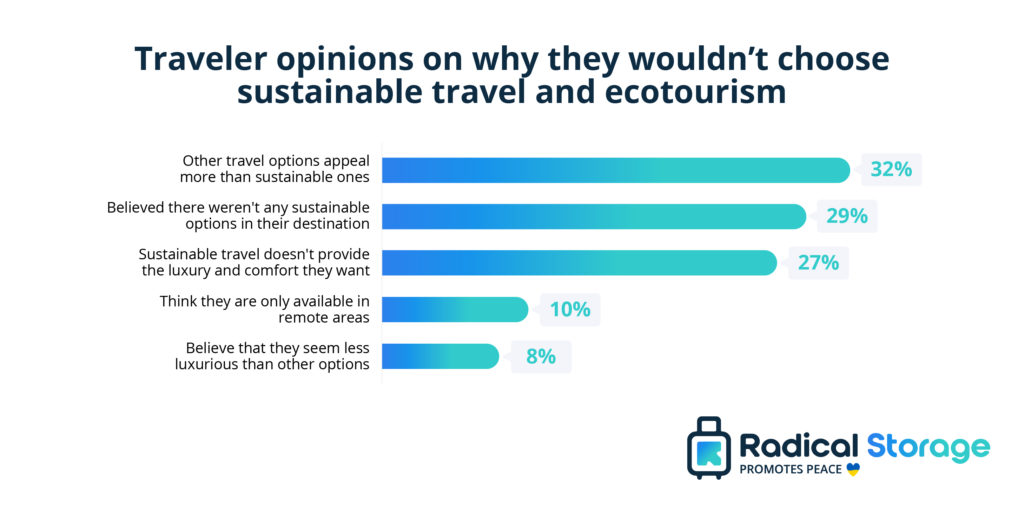
Other reasons people said they hadn’t considered booking a sustainable trip were that they thought there weren’t any available in their chosen destination, or they thought they were only in remote areas. This again shows that ecotourism companies can do more to expand their reach and bust some of the common myths about these types of accommodation.
The costs of ecotourism
When looking for more eco-friendly travel options, it can seem that this type of travel is more costly than more traditional options. This may be because sustainable tourism spots are often managed by smaller local businesses rather than large global travel companies.
Almost half (49%) of people surveyed believe that more sustainable travel options are too expensive; this figure has increased by 11% since 2022. In addition to this, 47% of people would like more tips on how to travel sustainably on a budget.[6]
But there are many ways that eco-friendly travel can be cheaper compared to other options. For example, those looking to travel within the US could make considerable savings by using trains instead of taking a flight, especially when according to the IATA, air travel produces 2.5% of the world’s greenhouse gas emissions.
Cost savings from taking a train over a flight
The data below shows the average cost saving someone could make by taking the train between popular destinations in the US instead of a flight. Taking the train to Portland from Seattle would cost an average of $400 less than taking a flight.
| Journey | Rail | Air | Saving |
| NY to Boston | $162 | $290 | $128 |
| NY to Washington | $188 | $291 | $103 |
| Miami to Tampa | $100 | $375 | $275 |
| Los Angeles to San Diego | $54 | $259 | $205 |
| Seattle to Portland | $63 | $463 | $400 |
While it may seem like taking the train is less time efficient, with a Seattle to Portland train taking around three and a half hours, compared to a 55-minute flight, when factoring in airport wait times and security queues, this can easily add a couple of hours onto the total plane journey.
Ecotourism and accommodation cost
We wanted to know what the average cost difference is for tourists who want to opt for more sustainable hotels and accommodation compared to ‘regular’ non-eco touristic options. We reviewed the ten most popular city break destinations and compared ecotourist accommodation to regular options to see what the difference may be.
On average, opting for sustainable accommodation costs $151 less per night, and is an average of 39% cheaper than non-sustainable options. This amount will likely be quite different when solely reviewing cheap hostels, or dorms, but it may be cheaper than people think to get a more sustainable hotel option.
Our analysis reviewed the price of apartments, hotels, and aparthotels that were ‘Top reviewed’ on Booking.com, with and without the ‘Travel sustainably’ filter they offer. Data reflects the cost of hotels for a November 2023 booking in the top ten visited cities as stated by Euromonitor [5] Paris, Dubai, Amsterdam, Madrid, Rome, Berlin, New York, London, Munich, and Barcelona.
Ecotourism and local communities
Engaging with the local community is a key part of ecotourism as it supports smaller businesses and directs spending to local people rather than large travel companies who may engage in less sustainable practices.
Data shows that global travelers are interested in having cultural experiences and giving back to the local communities in places that they visit. Two-thirds (66%) of global travelers said they want an authentic experience representing the local culture, and 27% said they actively research a destination’s local culture before visiting.
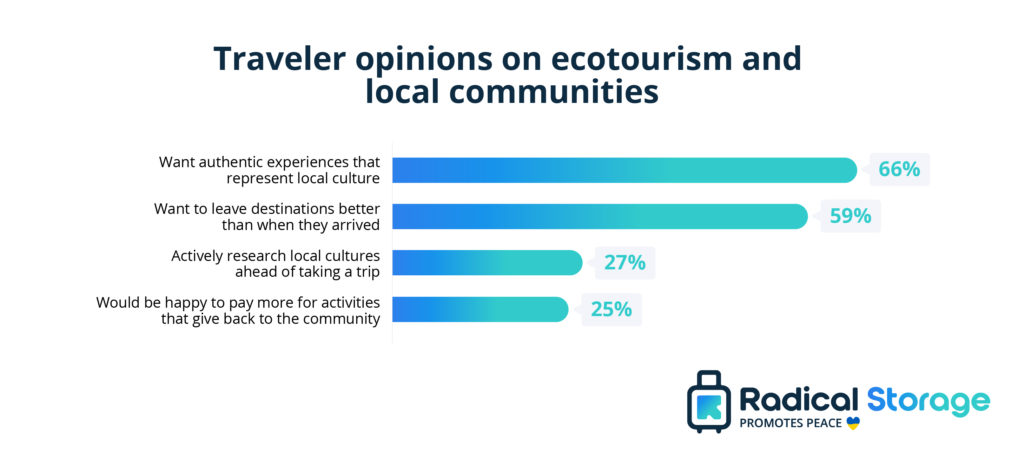
Another survey on travel predictions for 2022 found that 58% of travelers think it’s important that their trip benefits the local community, and 29% said that they would do more research into the effect their visit will have on local communities.[4]
Sustainable transport
When it comes to traveling, transport is one of the most important aspects to consider, especially if you’re making an effort to travel in a sustainable way.
It is important to choose the train for long-distance travel: set down the car and depart from stations in London, Paris, Milan, Rome, Venice, Prague, Budapest, Edinburgh, Barcelona, Madrid, Amsterdam, Dublin or Valencia, so you can enjoy a more environmentally sustainable trip.
Below are some statistics surrounding sustainable transport and how people are planning to change modes of transport to reduce their carbon footprint.
Choosing modes of transport
Statistics show that 30% of global travelers feel bad or ashamed about flying when they travel because of the impact on the environment. Almost a quarter (22%) say they research public transport links or bike rental options when they travel, while 20% choose trains over cars for long journeys, and only 11% have rented a low-emissions car when traveling.
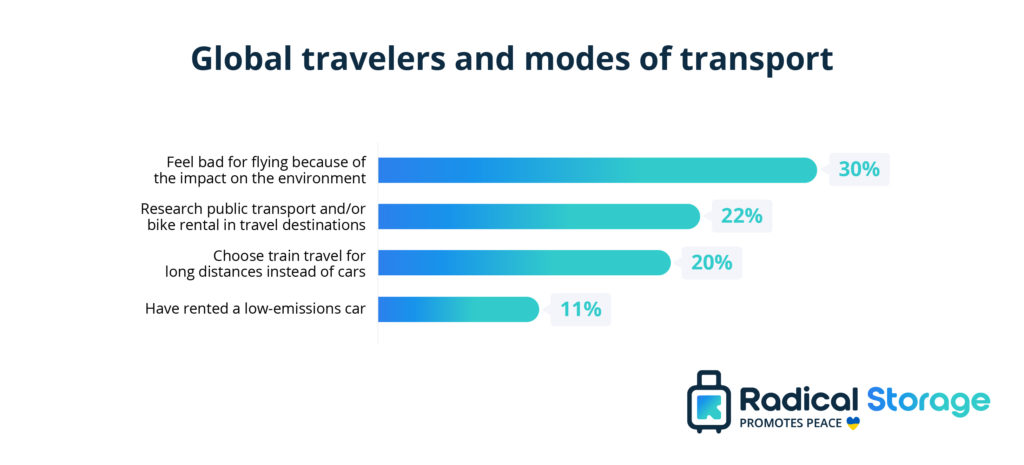
Planning transport for future trips
Of those asked, three-quarters (75%) of global travelers said they planned to use more eco-friendly transport like bikes or public transport on their next trip, instead of taxis and rental cars.
As well as this, 28% said they would take a longer journey to their destination by using trains instead of cars or planes, in order to reduce their carbon emissions.
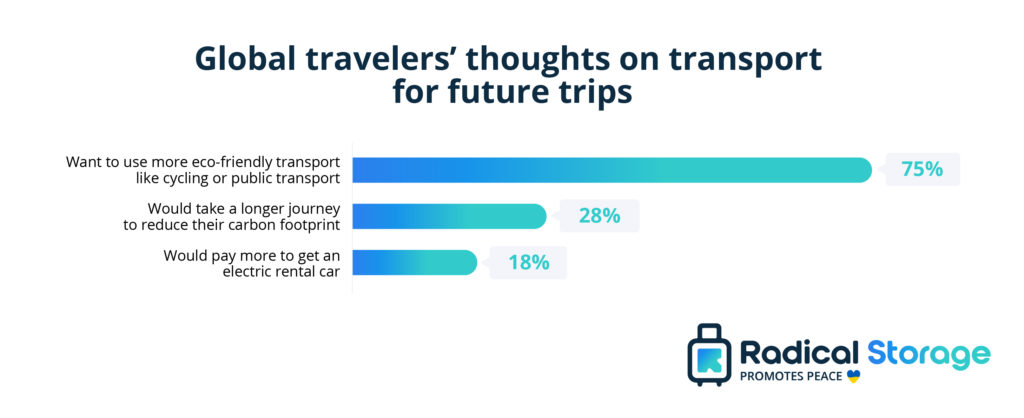
When it came to car rentals, 18% of respondents said they would pay more to rent an electric car instead of a gas car on their travels. There was no data on how much extra individuals would be willing to pay for this more eco-friendly tourism option though.
Ecotourism and staycations
Taking trips that are closer to home and require less travel via planes is one way of traveling more sustainably and with the environment in mind.
More than half (57%) of people said they would consider going on trips that weren’t as far afield in the future, and one-third (33%) would be willing to do so to reduce their carbon emissions. Almost a quarter (23%) said they have already chosen to travel to a destination closer to home in order to limit their effect on the environment.
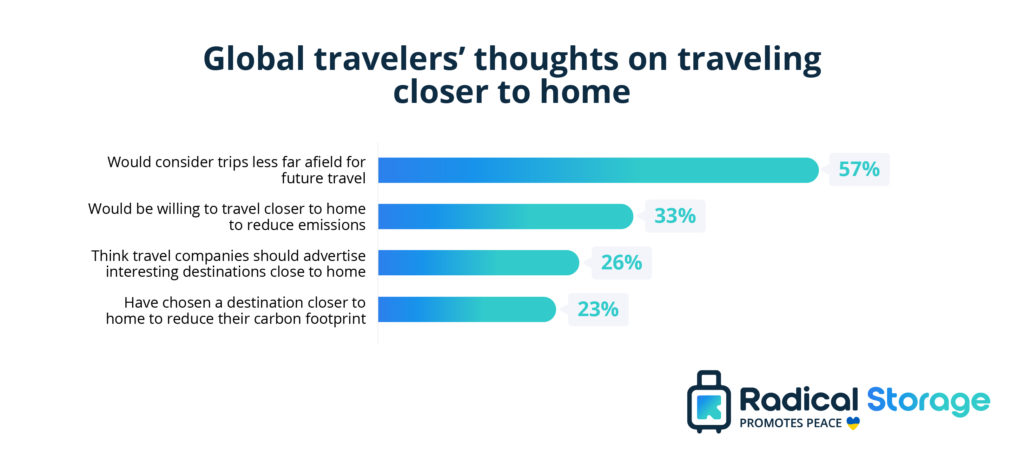
How travelers are being more sustainable on vacation
Travelers are taking a number of steps to make themselves more eco-friendly when taking a trip. Three-quarters (77%) regularly turn off lights and appliances at their accommodation when they weren’t there, and 67% turn off air conditioning.[6]
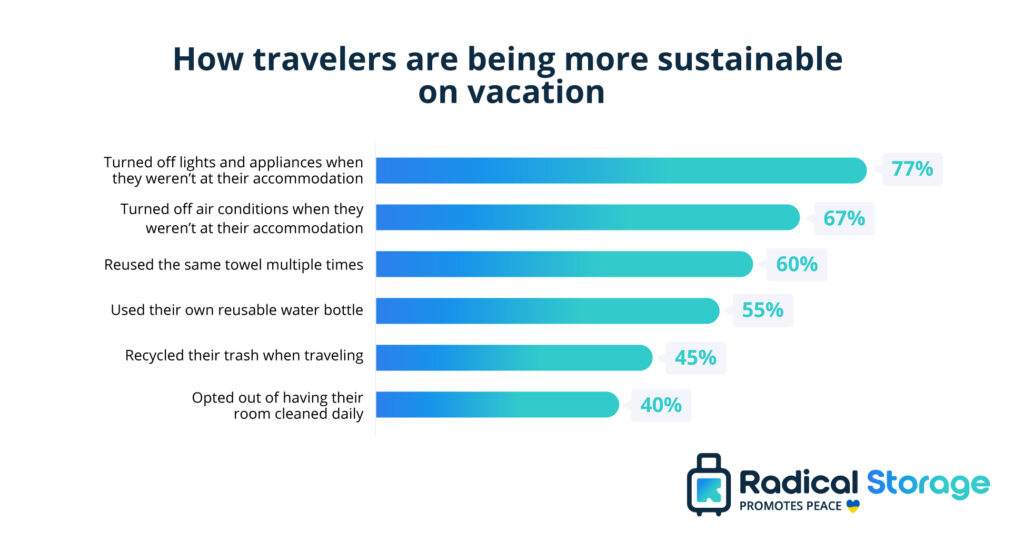
What accommodation providers can do to be more eco-friendly
Many travelers believe that hotels and other accommodation providers could do more to improve their sustainability.
- Over one-third (35%) of people said they think heating and air conditioning and hotels should be controlled by in-room keycards or sensors in order to save energy.
- Accommodation providers should give visitors more information about local culture, heritage, ecosystems and etiquette when visiting a location (32%).
- More than a quarter (27%) would choose to opt out of having their room cleaned daily so that water usage could be reduced.
- Some would prefer to only use reusable cutlery and plates for meals and room service rather than disposable items (27%).
While things like reducing water usage or cutting down on single-use items are relatively quick things to implement, other measures require more time and investment to achieve. In the short term, hotels can focus on simpler changes, but a longer-term sustainability plan would be needed for more complex changes.
2024 predictions for ecotourism
A study by Booking.com found that travelers are continuing to seek out sustainable ways to travel in 2024. More than half (53%) say they are looking for accommodation that combines comfort with innovative sustainability.
Additionally, 60% of travelers say they would like to use sustainable travel apps that unlock rewards for sustainable decisions. 44% say they’d like to visit less touristy spots and 47% say they’re planning experiences to connect with local people in less traveled areas.[7]
Benefits of sustainable travel
Ecotourism has a number of benefits for the environment and local communities as well as travelers. Below are some of the key benefits of sustainable travel.
- Less impact on the environment – Staying in locally run accommodation and eating local food helps reduce your ecological impact as you’re not relying on imported goods. By eating local produce and visiting independent restaurants, you can enjoy fresher food that has less of a carbon footprint.
- Supports local communities – Using sustainable accommodation and local companies, you support the community by directly paying into their economy. Many locations where tourism is operated by large companies can miss out on this financial benefit. Using providers who work with local people can help give this benefit directly back to the community.
- Helps conserve wildlife ethically – Some tourist attractions involving animals can be popular for visitors, but are not necessarily good for the animals themselves. A lot of attractions like elephant riding and tiger meet-and-greets are not run ethically, so sustainable tourism involves educating yourself about these practices. Instead, look for organisations focused on conservation and consider volunteering if you’d like to experience some amazing wildlife.
Sources
[1] The Business Research Company, ‘Ecotourism Global Market Report 2024’ (https://www.thebusinessresearchcompany.com/report/ecotourism-global-market-report)
[2] Booking.com, ‘2022 Sustainable Travel Report’ (https://globalnews.booking.com/download/1161485/booking.comsustainabletravelreport2022final.pdf)
[3] Travel Incorporated, ‘Sustainable Travel Doesn’t Have To Cost More’ (https://www.travelinc.com/sustainable-travel-doesnt-have-to-cost-more/)
[4] Booking.com, ‘2022 Travel Predictions’ (https://www.booking.com/c/trends/travelpredictions2022.en-gb.html)
[5] Euromonitor International, ‘Top 100 City Destinations Index 2021’ (https://go.euromonitor.com/rs/805-KOK-719/images/wpTop100CitiesIndex2021-v0.4.pdf)
[6] Booking.com, ‘Sustainable Travel Report 2023’ (https://globalnews.booking.com/download/31767dc7-3d6a-4108-9900-ab5d11e0a808/booking.com-sustainable-travel-report2023.pdf)
[7] Booking.com, ‘Travel Predictions 2024’ (https://www.booking.com/c/trends/travelpredictions2024.en-gb.html)

This work is licensed under a Creative Commons Attribution-ShareAlike 4.0 International License

